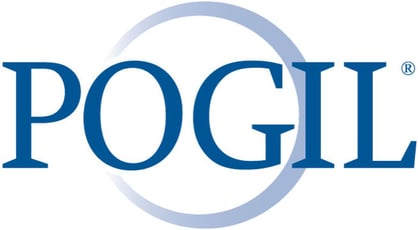
The POGIL Project
Our Vision...
At The POGIL Project, we believe every student deserves an education that prepares them to think critically, solve problems, work with others, and experience the joy of discovery.
What is POGIL?
POGIL stands for Process Oriented Guided Inquiry Learning, a learning approach where student teams work together to construct their own understanding of content while developing skills such as critical thinking, teamwork, problem-solving, and communication, now recognized as essential for success in school, and highly-valued by employers.
What sets POGIL apart...
What sets POGIL apart is its focus on the development of key skills combined with the deep, meaningful learning that happens in a POGIL classroom environment. Time and again, we hear teachers say they could never go back to lecturing after seeing how well students learn with the POGIL approach.
Thank you to our many donors and funders, including the National Science Foundation and the Google Education Fund.
"I think it only takes one person who is excited and engaged to get other people excited," said Ashley Hill, a high school science teacher in Fullerton, California.
POGIL has made such a difference in her own classroom and the classrooms of her colleagues, that Hill has become passionate about trying to connect other POGIL educators in Southern California. She knows how infectious the energy of an engaged community of educators can be, too.
But it wasn't until she attended a three-day workshop with two of her colleagues that she realized something important: she'd been doing it all wrong.
"I think a lot of people see POGIL classroom materials as a photocopied resource that's just handed out," Hill said of teachers who encounter POGIL worksheets and materials without being trained to facilitate activities. And, for a few years, she was one of them.
But the three-day training fundamentally changed Hill's perspective."We were super motivated, and we picked up a ton of skills and information in the three-day workshop, brought it back for next year, and completely changed the way we use it in our classroom," she said.
The POGIL workshop also provided Hill with a new community of educators to tap into, and she launched herself into trying to bring other teachers in Southern California on board with the approach. However, public school teachers in Los Angeles and surrounding counties face steep challenges to accessing professional development activities, says Hill.
In order to convince her school to let her take time off to attend her very first POGIL workshop, for example, Hill promised to slash travel expenses by staying with a relative. Teachers in the greater Los Angeles area are often responsible for paying for their own substitutes, too.
In addition to a structural lack of support for professional development, Hill notes that teachers like her in Southern California face additional challenges in the classroom. They have huge student populations to educate, and those students have a large range of needs. And, in discovering POGIL classroom activities, Hill found a great way to boost the confidence—and the performance—of students who struggled, especially English Language Learners.
Hill is also excited about the number of student teachers she comes into contact with—they're young, motivated, and excited to try new ways of instruction. "Student-centered learning and inquiry and process skills—they're really valuable resources for the next generation of students and teachers."
Financials
Programs
NCAPP
“Everyone has a story to tell and experiences from which we can all learn.”
On June 24, 2019, The POGIL Project welcomed 87 experienced high school and college educators to the National Conference of Advance POGIL Practice. Held every two years, the goal of NCAPP is to create a unique environment where POGIL practitioners can come together to share new ideas, receive feedback to improve their practice, engage in in-depth discussions, interact with a diverse community of teachers, and gain a deeper mastery of the POGIL approach. The next NCAPP will be held in June of 2021, in Salt Lake City Utah.
Even though we do our best to keep fees as low as we can by staying in college dorms and accounting for every penny, we are always in need of scholarship funds to help make it possible for teachers like Ashley Hill-- teachers with little or no access to professional development funds--to attend POGIL Workshops and meetings.
POGIL 3-Day Summer Workshops
"Our goal as educators is really the same. We all just want kids to be thinkers. We want our students to grow up and make meaning for themselves. POGIL is one way that allows us to help kids with that process, and to make those connections."
Our signature annual teacher workshops, the 3-day summer experiences provide training for beginners and experienced educators alike. Each of the four regionally-based workshops provides tracks to help teachers get started with classroom facilitation, with facilitating science labs, and with writing POGIL activities for the classroom. We train more than 200 teachers each summer.
POGIL Classroom Materials Development
Since 2012, The POGIL Project has developed and published more than 26 peer-reviewed collections of activities for middle, high school, and college students across nine disciplines.
Demand for peer-reviewed activities, workshops, and mentorship opportunities continues to outpace our capacity for delivery. Currently, we devote most of our volunteer and staff time to refining and improving existing curricular materials to comply with new national standards for STEM.
Based on our strategic priorities, The POGIL Project aims to develop new collections of activities for the following areas: secondary math, college-level biology, college-level physics, and environmental science at both the secondary and college levels.
All told, the creation of each new collection of activities costs between $7,500 and $10,000.